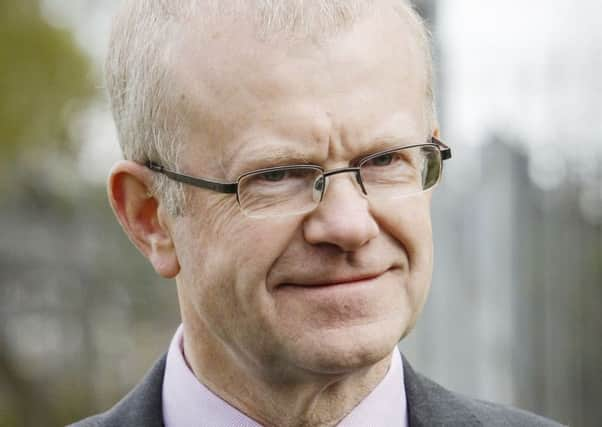Tom Peterkin: Boycotts and bleating get in the way of governing


John Mason’s online confession that he boycotts Barrhead Travel in protest at the anti-independence stance taken by its founder was an uncomfortable flashback to the 2014 independence referendum.
Back then such remarks were commonplace as passions ran high and rash words were spoken by people who should have known better.
Advertisement
Hide AdAdvertisement
Hide AdBut almost two years after a majority of Scots rejected independence, Mason appears to still hold a grudge against the travel agency.
“I’m boycotting Barrhead Travel as they’re on the No side. Got euros elsewhere,” Mason said this week in a tweet, which has attracted widespread condemnation and ridicule.
When it is considered that Barrhead is one of the UK’s most respected travel firms and employs workers in Mason’s Glasgow Shettleston constituency, the SNP politician’s remarks were crass in the extreme.
His antipathy towards this major Scottish employer presumably stems from the uncompromising pre-referendum stance taken by Bill Munro, the entrepreneur who built the business up from nothing, creating hundreds of jobs in the process.
In the run up to the 2014 vote, Munro sent an e-mail to most of his staff warning that splitting up the UK would be “a complete disaster” for the travel industry.
Munro’s e-mail listed his concerns about Scottish independence including debt levels, the currency and North Sea oil revenues.
To talk of boycotting a firm on the grounds that its boss’s take on Scotland’s constitutional question differs from your own takes churlishness to a depressing level. Notwithstanding the fact that Munro holds a perfectly legitimate political view, the idea of boycotting Barrhead Travel in order to get one over on No supporters defies reason. Presumably Barrhead Travel is like every other workplace in Scotland in that its workforce will include people on both sides of the independence question.
Amid all this nonsense, the most charitable interpretation of Mason’s tweet came from the Tory MSP Murdo Fraser, who said the “only possible explanation” was that Mason was “joking”.
Advertisement
Hide AdAdvertisement
Hide AdSadly, Mason later confirmed that he had tweeted in all seriousness telling STV news that he “hasn’t used” the travel agency since Munro’s intervention in the independence debate. Companies, Mason thought, should not have entered the political fray during the referendum.
Had the MSP’s tweet been intended as a joke, it would not have been a very funny one. Indeed, far funnier was the response of the Labour MSP James Kelly, who took great delight in lampooning Mason.
“John Mason must have difficulty going about his daily business if he refuses to deal with those who raised concerns about independence,” Kelly said. “By his own logic he can’t do his shopping in Asda or Morrisons. He can’t fill up his car in a BP or Shell petrol station. He can’t buy any DIY products from B&Q. He can’t bank with RBS or Lloyds. He can’t go to the pictures at the Parkhead Forge in his constituency to watch anything to do with Harry Potter, Judi Dench, Emma Thomson or a load of other entertainers.
“He can’t enjoy the music of Rod Stewart, David Bowie or Susan Boyle. He can’t even eat a Tunnock’s tea cake. It’s barely worth John Mason getting out of bed in the morning.”
Encouragingly, there were many in the SNP who took issue with Mason’s stance. The SNP Renfrewshire South MSP Tom Arthur said he was happy to use Barrhead Travel and would recommend them to others.
An official statement from the SNP said individuals and businesses were entitled to express their views and contribute to political debate and reassured the public that the party did not seek to “influence people’s consumer choices on the basis of those views”.
Much as that outbreak of sanity should be welcomed, the spat still managed to instil a sense of foreboding.
If it was an uncomfortable flash back to the past, it was perhaps also an equally uncomfortable warning about the future.
Advertisement
Hide AdAdvertisement
Hide AdIn the aftermath of the Brexit vote, expectation of a second referendum is being stoked up – something that does nothing to heal the wounds opened up by the first one. Mason’s ill-judged tweet serves as a reminder of just how divisive things can become.
Perhaps the best course of action is for our politicians to concentrate on doing the thing they are paid to do – running the country. Admittedly, that is not such an easy task given the uncertainties thrown up by Brexit but life is too short to be spent in a succession of constitutional squabbles. Children need to be taught and patients need to be treated. With that in mind, it was a little unsettling to see Alyn Smith, a thoughtful and considered SNP politician, suggest there should be yet another referendum – this time on the monarchy.
As part of his pitch to become SNP depute leader, Smith appealed to the strong republican element in his party by proposing that a vote on whether or not to keep the Queen could be held in an independent Scotland.
Alex Salmond and Sturgeon both accepted that getting rid of the Queen would be a vote-loser. Hence their position that the Queen should remain head of state in Scotland in the event of a Yes vote. Instead of bleating on about referendums and boycotts, what about showing a bit of leadership and getting on with the job in hand?